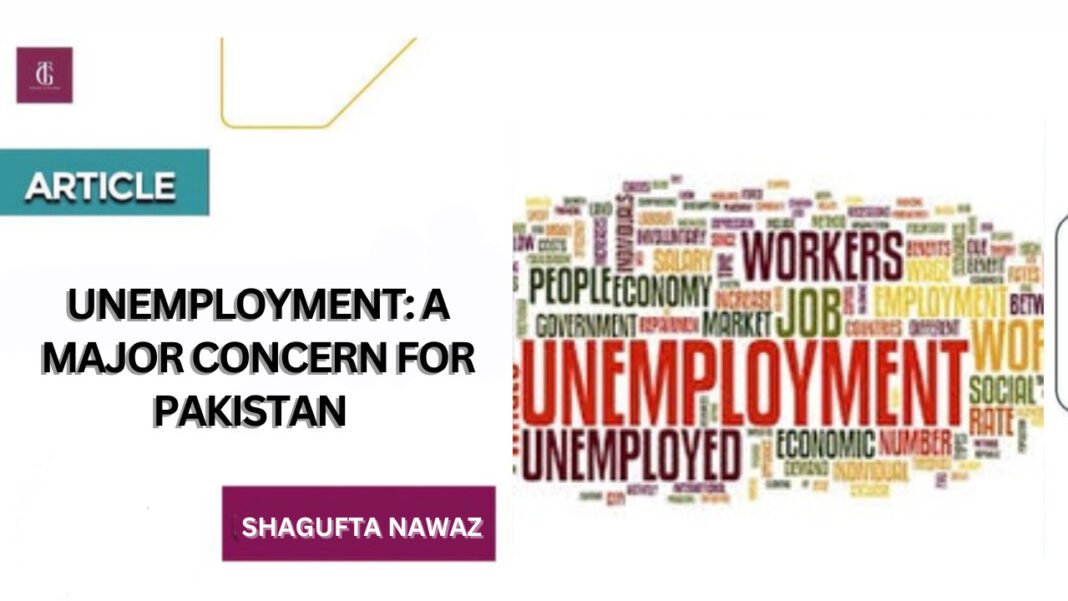Unemployment has become an alarming issue in Pakistan nowadays. Not just an individual but society and the economy are severely affected by the repercussions of unemployment. When a person is jobless but actively looking for work, such a person is considered unemployed. One of the most pervasive issues in Pakistan is unemployment. It is seen as a reflection of a nation’s economy. Since Pakistan’s founding in 1947, unemployment has been a significant issue because its economy has been shaky. 6.65 million individuals in Pakistan are unemployed. Comparing degree holders to the rest of the unemployed, the unemployment rate is three times greater. It is the despair of every university student and recent graduate. Every year, a staggering number of people graduate from institutions. On the other side, fewer jobs are available in their respective industries. The number of unemployed individuals in the country would increase by more than 2 to 8 million by the end of 2023, predicts Hafiz Pasha, a well-known economist. Gender disparity exists similarly. In Pakistan, there are more women without jobs than men.
Several factors contribute to the high unemployment rates in Pakistan. The country’s economy is in a miserable situation right now. It is no secret that dollar rates have skyrocketed and that fuel and petrol costs have reached record highs. Every single item now has such a high price. People in the middle class struggle to make ends meet. Undoubtedly, the COVID-19 epidemic and the string of lockdowns played a role. The aftermath has resulted in even greater economic losses. For almost two decades, Pakistan has been experiencing an energy crisis. Exports of petroleum predominate. The country’s electricity production cost is considerably high because they consume so little but pay such high costs people find it extremely difficult to pay hefty electrical bills. The government is unable to create more jobs because of the energy problem. Youth unemployment is also substantially impacted by the expanding population. There are fewer opportunities available as the population increases. Due to this intense competition at work, it is challenging for young people to find gainful employment. The country is affected by this unemployment, both in urban and rural areas. This negatively affects Pakistan’s future, development, and socioeconomic status.
A lack of educational opportunities is one of the main causes of youth unemployment in Pakistan. In Pakistan, just 43% of people have had a formal education. Many young people cannot obtain employment that matches their skills and qualifications because they lack access to high-quality education. Unemployed teenagers are, therefore, prevalent in the country. Young people have low economic productivity and skill development levels due to a lack of excellent educational and vocational training programs. Most young people struggle to find fulfilling employment, leading to prolonged unemployment.
Political instability is a big contributor to young people’s unemployment in Pakistan. The country has seen several political upheavals recently, which has complicated trade and investment. As a result, fewer job openings, and a higher proportion of young people are unemployed. The lack of resources is a grave problem in Pakistan. Many young people lack access to resources like money, technology, and mentors that would enable them to find fulfilling employment. There are also fewer employment opportunities due to the government’s underinvestment in the agricultural and industrial sectors. As a result, the private sector has little incentive to create jobs, which increases the unemployment rate for young people. The poverty rate in the nation is thought to be around 32%.
Unemployment in Pakistan carries significant consequences that affect various aspects of society and the overall economy. In the Bureau of Immigration’s latest document, many skilled and educated youth have fled Pakistan to pursue a better life and work in 2023. According to the report, about 75000 Pakistanis have traveled in the past years to different countries due to political instability and the growing economic crisis. The top bureau officer claims that the main causes of this youth brain drain are rising inflation, unemployment, and political unpredictability. Pakistan has lost 7,000 engineers, 25,000 doctors, 1,600 nurses, 2,000 computer professionals, 6,500 accountants, 2,600 agricultural experts, and 9,00 teachers due to this brain drain this year.
Unemployment can contribute to social unrest and an increase in criminal activities. Joblessness, particularly among the youth, can breed frustration, disillusionment, and a sense of hopelessness, leading to social unrest and protests. Desperation for income may drive individuals towards illegal activities to make ends meet, increasing crime rates. Unemployment-induced social instability threatens social cohesion and overall peace within communities. This has affected Pakistani society severely, and its impacts can be seen with the immigration of skilled youth to different countries seeking jobs. Joblessness has caused emotional distress, eroded self-esteem, and diminished the overall well-being of individuals and their families.
It is high time that the government should tackle this pressing issue and prioritize creating an enabling environment for job growth, encouraging entrepreneurship, and attracting domestic and foreign investments. Educational reforms are necessary to bridge the skills gap and align education with market demands. Investment in vocational training programs, apprenticeships, and skill development initiatives can enhance employability and provide individuals with the tools they need to succeed in the job market. Furthermore, targeted social welfare programs can provide temporary relief and support for the unemployed while they seek employment.
Unemployment is a major concern for Pakistan, impacting individuals, society, and the overall economy. Policymakers, businesses, and society must collaborate in developing comprehensive strategies that create more job opportunities, address the skills mismatch, and foster an environment conducive to entrepreneurship and investment. By prioritizing the reduction of unemployment, Pakistan can unlock its potential, improve living standards, alleviate poverty, and pave the way for inclusive socioeconomic progress.

Shagufta Nawaz
The student of political science at Quaid e Azam university Islamabad.






